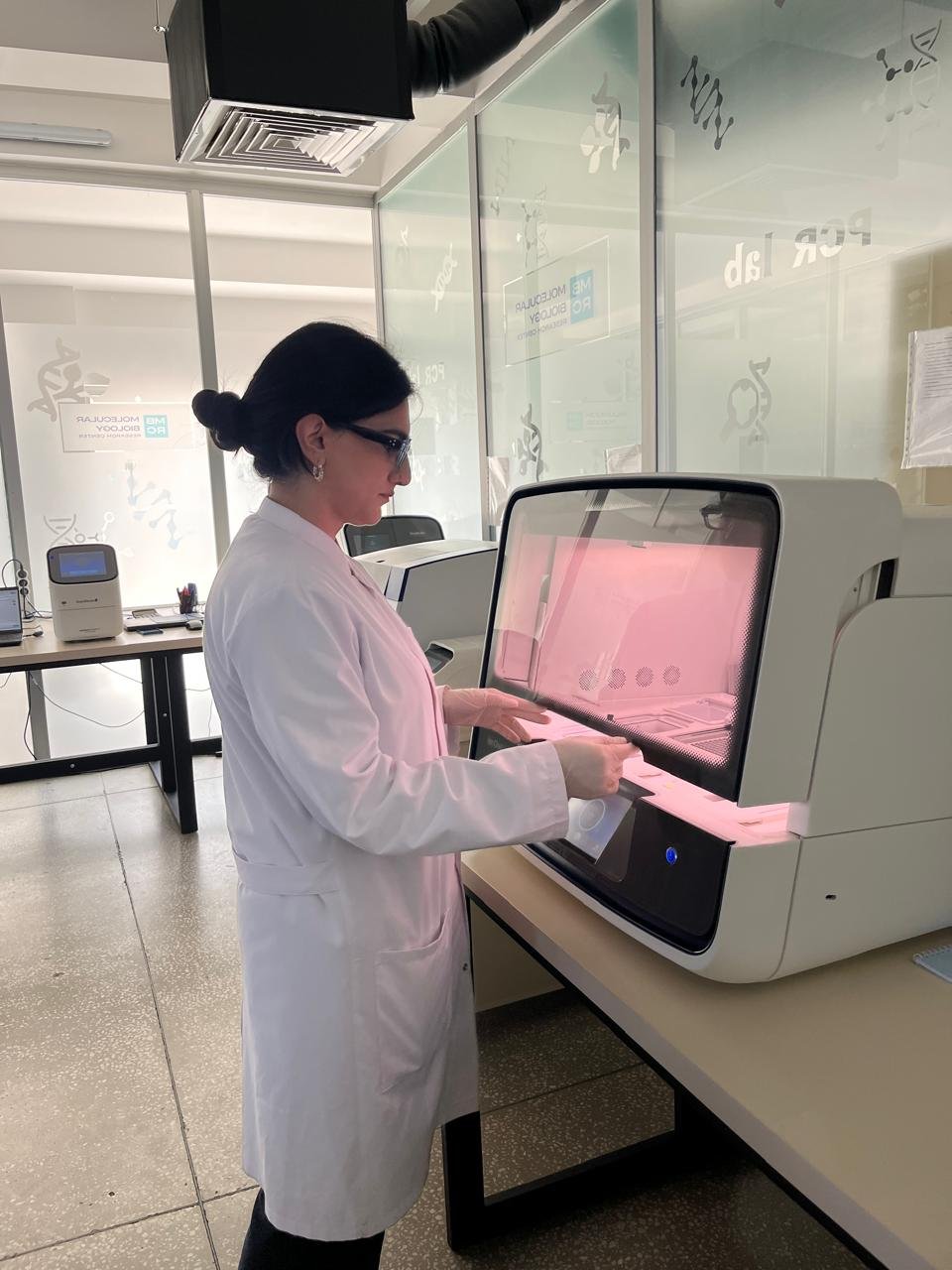About Us

About NV Genetics
NV- Genetics is the first center affiliated with New Vision University, compliant with international standards and accredited with ISO 15189, which offers Georgian citizens diagnostic services in the process of personalized treatment of oncological diseases and performs identification of oncogenetic mutations on-site, using the Next-Generation Sequencing (NGS) technology. Nowadays, molecular diagnostics is an indispensable and critical component for the precise diagnosis, subtyping, prognosis, and also for getting predictive information about numerous diseases. Knowledge and experience of our team in the fields of genetics, molecular biology and bioinformatics, allows us to provide physicians, researchers and geneticists with an essential information.
The technologies implemented at the NV-Genetics Center (Next-Generation Sequencing, Sanger sequencing, flow cytometry, real-time Polymerase Chain Reaction) provide an excellent base for the implementation of research projects by students, residents, and doctoral candidates at New Vision University. The experience gained in the laboratory, will help students to develop the research, ethical, and practical skills necessary for their future laboratory and academic career, which will increase their competitiveness both - locally and internationally
In order to promote the development of personalized medicine and advanced molecular research technologies in Georgia, in addition to laboratory activities, we constantly exchange information with the field experts in order to be a valuable, trustworthy and informative link in the patient treatment process. The mission of the laboratory is to create the highest standard of service based on professionalism and modern technologies, which will enable rapid molecular diagnostics of genetic diseases, generate a genetic database and in long term, genetic profiling of the Caucasian population. We strive to create an environment where oncology or various types of genetically determined predispositions will no longer be obstacles for patients and together with physicians, we will change their lives for the better.
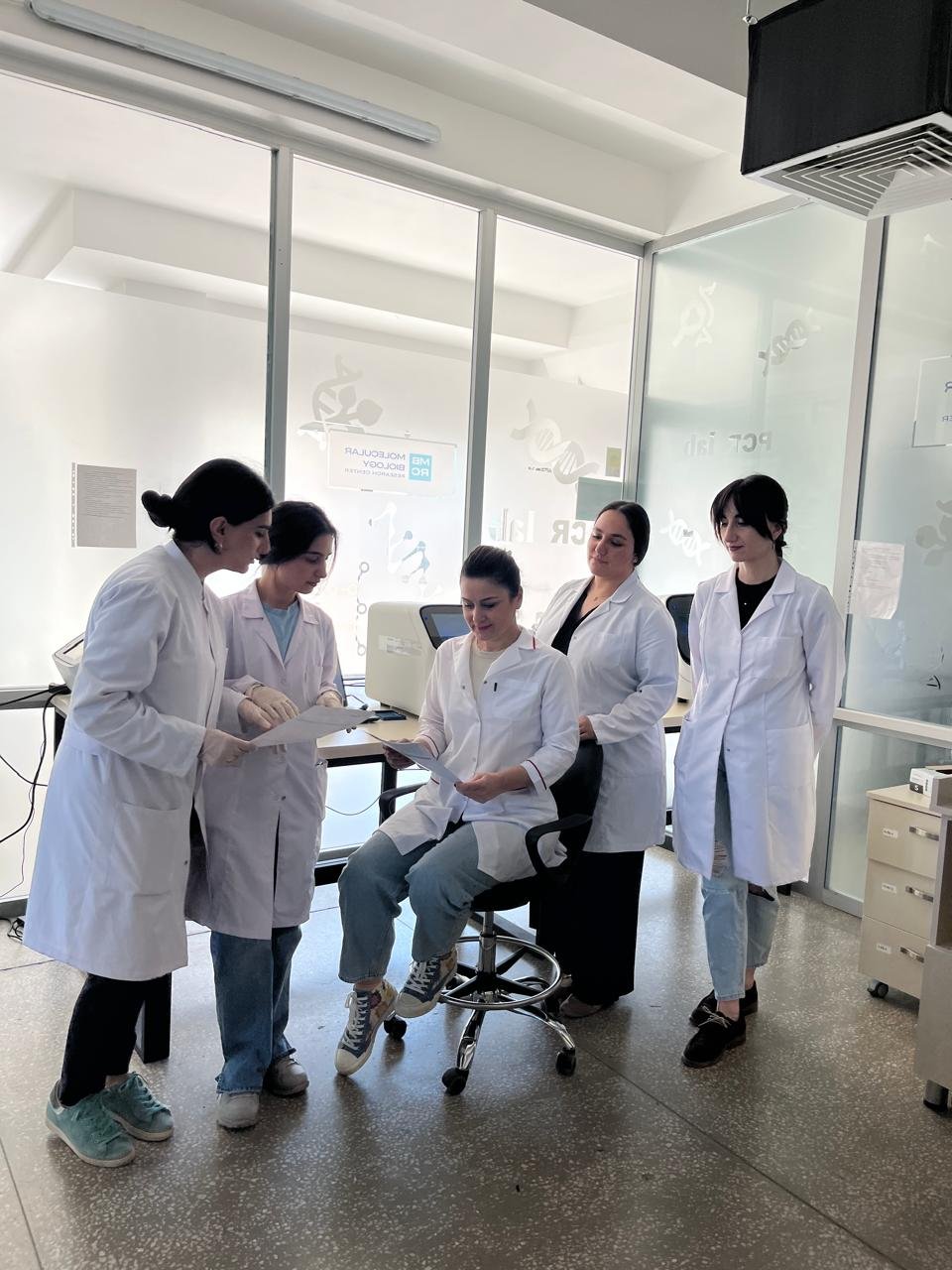
Quality Assurance
ISO 15189 accreditation indicates to the laboratory's compliance to international quality management standards and our expertise in providing medical laboratory services. The laboratory's main purpose is to manage a network of interrelated operations, which is carried out by the implementation of documented procedures. In parallel with the continuous education and training of employees, the laboratory constantly improves the quality of medical services provided to the patient. In accordance with quality requirements, the laboratory policy aims to:
- Meet customer demands and expectations
- Maintain high quality of service and continuous improvement
- Remain customer-oriented
- Ensure that the laboratory staff has the necessary skills and knowledge to conduct diagnostics and research

Our Technologies
The laboratory has implemented advanced research technologies in molecular and cellular biology, including: real-time Polymerase Chain Reaction (rt-PCR), Sanger sequencing, Next-Generation Sequencing (NGS), cytometry, etc. These methods allow us to perform both qualitative and quantitative detection of nucleic acids (DNA / RNA) and changes in them in a short time, with the highest accuracy and sensitivity. Using cytometry to differentiate cell populations according to their molecular profiles and other physical traits yields an immense amount of data for determining the type and severity of a disease, how it progresses, and how efficiently a treatment is responding. More information about mentioned technologies you can find below.
Next-Generation Sequencing (NGS)
The main feature of tumor genomics is somatic mutations that occur throughout the genome. Next Generation Sequencing allows the study of tumor genetics in a systematic manner, which creates opportunities not only for making the correct diagnosis, but also for classifying the disease, predicting its course, and selecting the personalized therapeutic approach disease management. Next-generation sequencing platforms differ in both engineering configuration and sequencing principles and technology. What they have in common is the technical paradigm of massively parallel sequencing, which is markedly different from the principle and scale of Sanger Sequencing, also known as capillary sequencing.
The high throughput and accuracy of next-generation sequencing have revolutionized various fields of genetic analysis and enabled the introduction of new applications in clinical research, reproductive health, agriculture, environmental and forensics at the genomic level.
Current NGS studies in the laboratory are focused on genomic profiling of oncological alterations and include many important biological markers, covering a total of 161 tumor-associated genes. This analysis allows for the detection of single nucleotide variants (SNVs), insertions and deletions (indels), copy number variations (CNVs), and fusion genes at the single nucleotide level, which is a key prerequisite for optimizing and personalizing treatment strategies.
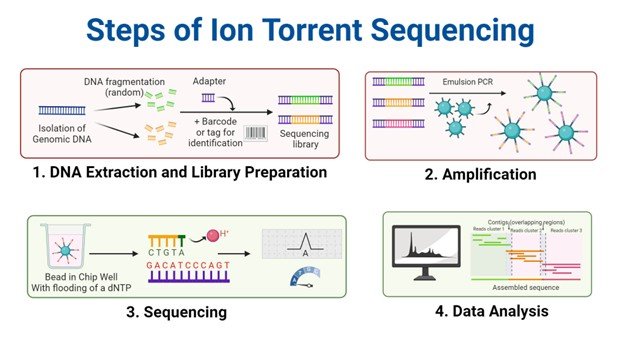
Real-Time PCR (qPCR)
Real-time polymerase chain reaction, also known as quantitative polymerase chain reaction (qPCR), is a method used for the amplification and detection of nucleic acids in real time. Unlike traditional PCR, which only allows visualization of the result after the experiment is completed, qPCR allows the amplification process to be monitored in real time and quantitative results to be obtained. Even at extremely low concentrations in a test sample, this technique can generate millions of copies of a particular nucleic acid fragment, enabling detection, genotyping, or quantitative analysis of the target.
In clinical diagnostics of tumors, the PCR method provides important information about the prognosis of patients and resistance to targeted therapies. Mutations in various genes are the triggers of many types of tumors, which can be identified quickly and relatively inexpensively with this method.
In addition to its diagnostic value, nucleic acid amplification by PCR is a necessary step in the sample preparation process of various, larger-scale technologies in molecular biology, such as next-generation sequencing, DNA microarray studies, the initial stage of capillary electrophoresis, and others.
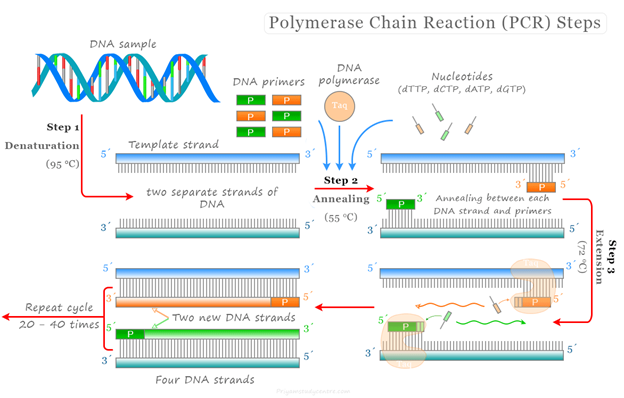
Sanger Sequencing
Sanger sequencing is a DNA sequencing method developed by Frederick Sanger and his research group in 1977 and first commercialized by Applied Biosystems. The principle of the method is the incorporation of terminal dideoxynucleotides into the synthesized chain by the enzyme DNA polymerase during in-vitro replication of the DNA molecule, and the subsequent analysis of DNA fragments of various lengths. Despite the development of new genome sequencing technologies, the Sanger method remains relevant and is widely used for the analysis of relatively small genetic sections, as well as for the validation of NGS results and the sequencing of long genes (more than 500 nucleotides).
Microsatellite instability (MSI) detection is increasingly used in clinical trials for two main purposes: 1) in the diagnostics of Lynch syndrome and 2) in the preliminary assessment of the effectiveness of oncological immunotherapy. The gold standard for MSI detection is a combination of two methods: PCR followed by capillary electrophoresis and fragment analysis. Microsatellite instability is frequently a target for analysis in tumors like endometrial carcinoma, colorectal adenocarcinoma, and gastric adenocarcinoma, and its confirmation is usually associated to a favorable clinical outcome after immunotherapy.
Other areas of application of Sanger sequencing include:
- Plasmid sequencing;
- Oncology research;
- Validation of next-generation sequencing (NGS) results;
- Analysis of genome editing by CRISPR-Cas9;
- Validation of human cell lines;
- Multiplex ligation-dependent probe amplification (MLPA) analysis for identification of human genome copy number variation (CMV);
- Species identification;
- Applied Biosystems SNaPshot genotyping.

Flow Cytometry
Flow cytometry is a technology for studying cells according to various parameters, which currently occupies an important place in immunological, bacteriological, virological, tumor biology and infectious disease research, diagnostics and monitoring. Over the past 30 years, this method has developed significantly and offers unprecedented detailed information in the study of the immune system and cell biology. For example, cytometry can be used to study the immune system and its response to infectious diseases or tumor processes with high efficiency. It allows us to simultaneously characterize mixed populations of cells from blood and bone marrow, as well as from solid tissues such as lymph nodes, spleen, mucous tissues, solid tumors, and others, in a short time.
Among the areas of application of cytometry, immunophenotyping is noteworthy, which is currently the most widely used and involves the simultaneous differentiation of multiple parameters of mixed cell populations. Also worth noting are such important areas of application as the study of cell signaling, cell cycle analysis, stem cell research, cell sorting and counting, the study of tumor and apoptotic processes, and the implementation of microbiological experiments.

Our Core Technologies
QuantStudio 5 Real-Time PCR System
The QuantStudio 5 real-time PCR machine is a platform with cutting-edge, superior features and broad spectrum of working modes. This platform meets the Good Laboratory Practice (GLP) guide and other clinical standards requirements. There are listed some advantages of QuantStudio 5:
- High sensitivity and specificity - important for both clinical and scientific research.
- A sophisticated optical system ensures fluorescence detection with high accuracy and provides reliable results in quantitative and other types of nucleic acid analysis.
- Multiplexing capability - involves the simultaneous specific detection of up to 6 different targets in one reaction, which ensures the speed and efficiency of the analysis.
- A thermal block based on special technology provides constant, precise temperature control, which guarantees stable and reliable results.
- Maximum data security and traceability are also provided in the QuantStudio 5 PCR system.
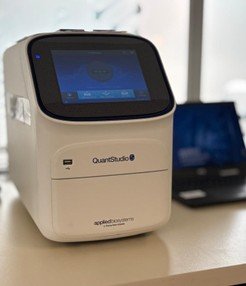
SeqStudio Genetic Analyser
The SeqStudio Genetic Analyzer is a highly optimized platform of Sanger sequencing and fragment analysis, which is simple to apply for a wide range of experiments. The instrument uses an innovative cartridge that includes everything in one system, with a single polymer, compatible with both sequencing and fragment analysis experiments. Advantages of the genetic analyzer:
- The SeqStudio genetic analyzer allows for individual cartridge design for different types of experiments;
- Different formats of results can be viewed on the screen and results can be easily evaluated;
- Through the Cloud system, the data from genetic analyzer is easily accessible to the operator at any time, via any Internet-connected computer, tablet, or mobile phone, which simplifies their management and monitoring.he analysis.
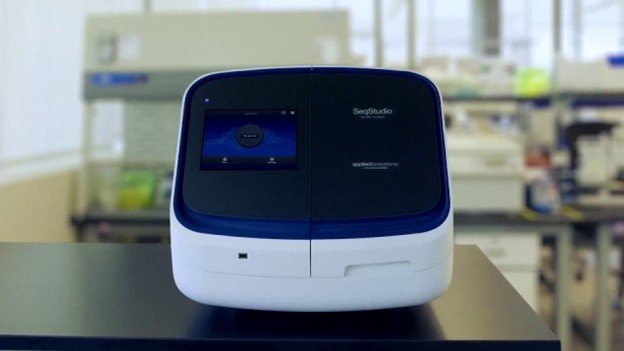
Ion Chef & Ion GeneStudio S5
TThe Ion Chef system automates the process of NGS library preparation steps like: template preparation and loadingon the chip, which are some of the most important initial steps in Next-Generation Sequencing, ensuring standardization and high-speed performance. The instrument's sophisticated visual system makes it easy to monitor the process during operation, and barcode recognition tool controls the expiration dates and correct placement of samples, chips, consumables, and reagents. The Ion GeneStudio S5 system is a semiconductor-technology based next-generation sequencing (NGS) platform that enables targeted sequencing experiments, including genomic, exome, and transcriptomic studies. The S5 system uses the chips of Ion 5 series. Through automated filtering and analysis of results, high-quality sequencing results are obtained for both clinical and scientific use. Major advantages:
- Standardization of experiments - reduced sample preparation time and complexity through cartridge-format reagents
- Speed - The Ion GeneStudio S5 series instruments optimally integrate semiconductor sequencing technology, which allows providing high-quality sequencing data in a few hours. Complete reaction analysis is also performed in a few hours
- Small sample size requirement - Sequencing is complicated with the low amount of DNA sample, when the sample is difficult to obtain or formalin-fixed paraffin-embedded tissue specimens (FFPE) are applied, as well as in the case of extracellular DNA (cfDNA) samples. With Ion AmpliSeq technology and the Ion GeneStudio S5 series of instruments, it is possible to obtain informative results even with a small initial sample size.
- Simplicity of data analysis and archiving - Using Torrent Suite and Ion Reporter bioinformatics softwares, management and interpretation of large amounts of data is relatively simplified.
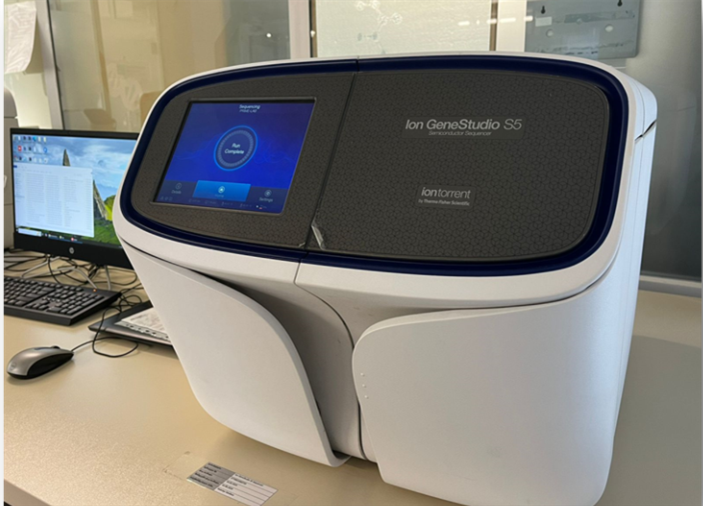

Cytometer - NovoCyte
NovoCyte is a superior level flow cytometry platform designed to enable high-quality experiments in a variety of laboratories. The instrument enables detection of up to 17 parameters with high sensitivity and resolution. The cytometer's versatility in terms of research objectives and specificity is derived from its ability to modify the laser and optic setup while maintaining the capabilities of complex cellular analysis. Possible areas of analysis include:
- The study of apoptotic processes, which is facilitated by the NovoCyte flow cytometer through automatic adjustment of compensation parameters and the selection of a wide range of fluorescence detection modes;
- Immunophenotyping with the NovoCyte flow cytometer is performed in a multiplexed manner, with simultaneous analysis of many leukocytes, which allows the researcher/physician to determine the patient's complete immune status and assess his/her response to an infectious agent;
- Cell proliferation can be assessed both by absolute cell quantification and by labeling with a suitable dye (CFSE), which is evenly distributed in newly formed cells after division;
- Detection of cytokines and their source of origin, which are the most important components of the immune response activated against different pathogens, by autoimmune reactions or therapeutic intervention, provides with an important information about gene regulation, immune response, and the course of inflammatory processes;
- Detection of intracellular proteins and (6) cell cycle analysis by labeling proteins and nucleic acids, respectively, are also experiments that can be performed with high accuracy and sensitivity using the flow cytometer described above.

Research & Collaboration
In partnership with New Vision University, NV Genetics provides students, residents, and PhD candidates access to modern equipment and real research opportunities. They gain skills in bioinformatics, molecular biology, and tumor profiling.
We support academic projects and scientific development through workshops, conferences, and direct collaboration with professionals in the field of personalized medicine.
